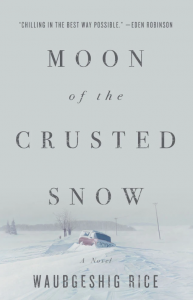
"By nature, some of that came out in the actual writing of this book. There are a lot of things you have to explain to people about why things are the way they are today. "In my work as a journalist I deal with a lot of context, especially when you're reporting on Indigenous issues and communities. I wanted the darkness to build." Putting past and present in context
I didn't want the story to be dark immediately. Things wouldn't be as hectic immediately it would be a slower burn. In a community like the one in the book, a catastrophe like this isn't going to come on as quickly as it would in the city. "I wanted the events in this story to slowly unfold. But there's still some knowledge of being able to live on the land and use the resources of the natural world to survive." Fade to black

I could draw the personal experience of growing up in a community like this. It's set in an Anishinaabe community that's dealing with the impact of being displaced and the effects of colonialism. Rice spoke with CBC Books about how he wrote Moon of the Crusted Snow. While the community tries to maintain order, forces from outside and within threaten to destroy the reserve. His latest novel, Moon of the Crusted Snow, is a dystopian drama about a northern Anishinaabe community facing dwindling resources and rising panic after their electrical power grid shuts down during a cold winter. Waubgeshig Rice is a novelist and host of the CBC Radio show Up North.


 0 kommentar(er)
0 kommentar(er)
